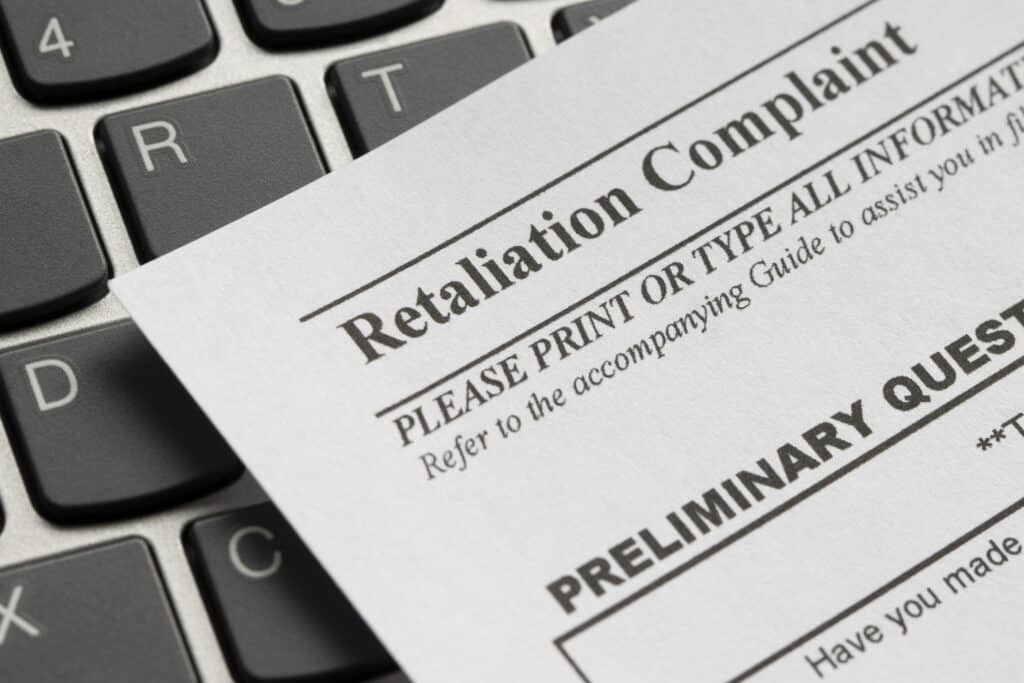
Reporting misconduct in the workplace, whether it’s fraud, safety violations, discrimination, or harassment, is a courageous act. But for many Washington workers, speaking up can lead to retaliation. Examples may include demotion, termination, harassment, or other adverse actions. If this sounds familiar, you may be a victim of workplace retaliation, and you have legal rights worth defending.
What Is Workplace Retaliation?
Workplace retaliation occurs when an employer punishes an employee for engaging in legally protected activity. This includes reporting illegal, unsafe, or unethical behavior, filing a complaint with HR or a government agency, or participating in an investigation.
Retaliation can take many forms:
- Termination or demotion
- Denial of promotions or raises
- Hostile work environment
- Unjustified negative performance reviews
- Exclusion from meetings or projects
- Surveillance or intimidation
These actions are not just unethical, they’re illegal under both Washington state and federal law.
Protected Activities Under Washington Law
Washington workers are protected when they report misconduct under several laws:
- RCW 49.60: Prohibits retaliation against employees who report discrimination or harassment.
- RCW 42.40: Protects whistleblowers in state government positions.
- OSHA Whistleblower Protection Program: Safeguards workers who report safety violations.
- False Claims Act and Qui Tam Provisions: Protects federal employees or contractors who report fraud against government programs.
If you’ve engaged in any of these protected activities and faced retaliation, you may be entitled to legal remedies.
Common Scenarios of Retaliation
Retaliation can happen in various workplace contexts. Here are a few examples:
- A warehouse worker reports unsafe conditions and is suddenly reassigned to a less desirable shift.
- An office employee files a complaint about wage theft and receives a poor performance review despite consistent work.
- A nurse reports patient neglect and is terminated under the guise of “restructuring.”
These are not isolated incidents; they’re violations of your rights.
What Legal Options Do You Have?
If you suspect workplace retaliation, you don’t have to face it alone. Here are steps you can take:
1. Document Everything
Keep detailed records of the misconduct you reported and any retaliatory actions that followed. Include dates, names, emails, and witness accounts. This documentation is crucial for building a strong case.
2. Review Your Employee Handbook
Your company may have internal procedures for reporting retaliation. Understanding these policies can help you navigate the process and demonstrate that you followed protocol.
3. File a Complaint
You can file a complaint with agencies such as:
- Washington State Department of Labor & Industries (L&I)
- Equal Employment Opportunity Commission (EEOC)
- Occupational Safety and Health Administration (OSHA)
These agencies investigate claims and can take enforcement action against employers who violate the law.
4. Consult an Employment Law Attorney
Retaliation cases can be complex. An experienced attorney can help you understand your rights, gather evidence, and pursue compensation. Emery | Reddy, PC’s legal team has over 80 years of combined experience helping Washington workers fight back against retaliation.
What Compensation Can You Receive?
If your claim is successful, you may be entitled to:
- Job reinstatement
- Back pay at double your regular rate
- Financial compensation for attorney’s fees
These remedies are designed to restore what you’ve lost and hold employers accountable.
Why Retaliation Claims Matter
Retaliation doesn’t just harm individuals; it undermines workplace integrity. When employees fear speaking out, misconduct goes unchecked, and everyone suffers. Protecting whistleblowers and retaliation victims is essential to creating safe, fair, and lawful workplaces.
Emery | Reddy Can Help
If you’ve been retaliated against for reporting misconduct, Emery | Reddy’s Employment Law Attorneys are here to help. We understand the emotional toll and career damage retaliation can cause. Our team will fight to protect your rights and pursue the justice you deserve.
We offer Free Case Reviews and work on a contingency basis. No fee unless we recover for you.




